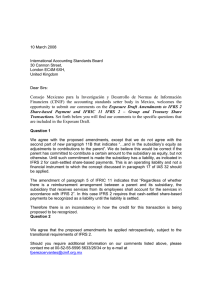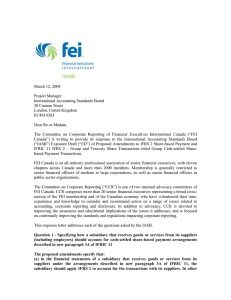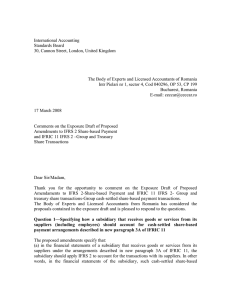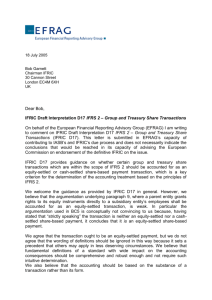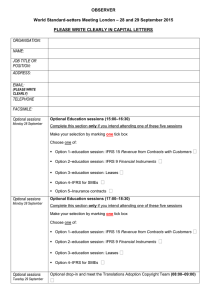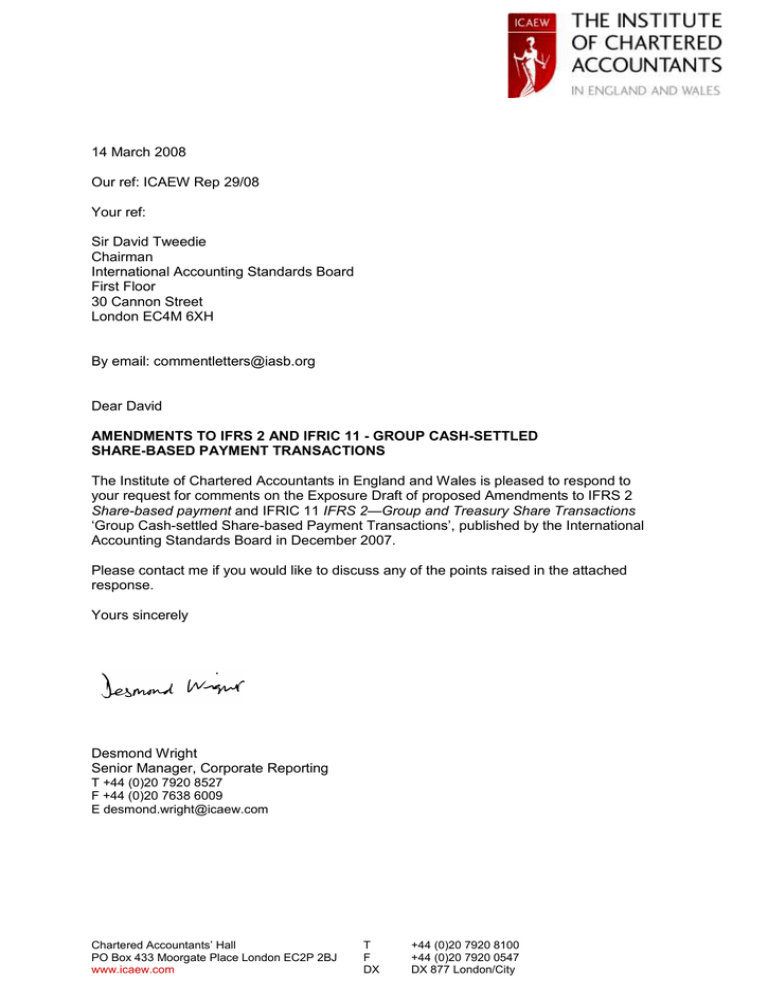
14 March 2008
Our ref: ICAEW Rep 29/08
Your ref:
Sir David Tweedie
Chairman
International Accounting Standards Board
First Floor
30 Cannon Street
London EC4M 6XH
By email: commentletters@iasb.org
Dear David
AMENDMENTS TO IFRS 2 AND IFRIC 11 - GROUP CASH-SETTLED
SHARE-BASED PAYMENT TRANSACTIONS
The Institute of Chartered Accountants in England and Wales is pleased to respond to
your request for comments on the Exposure Draft of proposed Amendments to IFRS 2
Share-based payment and IFRIC 11 IFRS 2—Group and Treasury Share Transactions
‘Group Cash-settled Share-based Payment Transactions’, published by the International
Accounting Standards Board in December 2007.
Please contact me if you would like to discuss any of the points raised in the attached
response.
Yours sincerely
Desmond Wright
Senior Manager, Corporate Reporting
T +44 (0)20 7920 8527
F +44 (0)20 7638 6009
E desmond.wright@icaew.com
Chartered Accountants’ Hall
PO Box 433 Moorgate Place London EC2P 2BJ
www.icaew.com
T
F
DX
+44 (0)20 7920 8100
+44 (0)20 7920 0547
DX 877 London/City
ICAEW Representation
ICAEW REP 29/08
AMENDMENTS TO IFRS 2 AND IFRIC 11 - GROUP CASH-SETTLED
SHARE-BASED PAYMENT TRANSACTIONS
Memorandum of comment submitted in March 2008 by The Institute of Chartered
Accountants in England and Wales, in response to the IASB Exposure Draft of
proposed Amendments to IFRS 2 Share-based payment and IFRIC 11 IFRS 2—
Group and Treasury Share Transactions ‘Group Cash-settled Share-based
Payment Transactions’, published in December 2007.
Contents
Paragraph
Introduction
1
Who we are
2
-
Major points
4
Answers to specific questions
5
Other issues
Chartered Accountants’ Hall
PO Box 433 Moorgate Place London EC2P 2BJ
www.icaew.com
3
-
10
11
T
F
DX
+44 (0)20 7920 8100
+44 (0)20 7920 0547
DX 877 London/City
INTRODUCTION
1.
The Institute of Chartered Accountants in England and Wales (the Institute)
welcomes the opportunity to comment on the Exposure Draft of proposed
Amendments to IFRS 2 Share-based payment and IFRIC 11 IFRS 2—Group
and Treasury Share Transactions ‘Group Cash-settled Share-based Payment
Transactions’, published by the International Accounting Standards Board in
December 2007.
WHO WE ARE
2.
The Institute operates under a Royal Charter, working in the public interest.
Its regulation of its members, in particular its responsibilities in respect of
auditors, is overseen by the Financial Reporting Council. As a world leading
professional accountancy body, the Institute provides leadership and practical
support to over 130,000 members in more than 140 countries, working with
governments, regulators and industry in order to ensure the highest standards
are maintained. The Institute is a founding member of the Global Accounting
Alliance with over 700,000 members worldwide.
3.
Our members provide financial knowledge and guidance based on the
highest technical and ethical standards. They are trained to challenge people
and organisations to think and act differently, to provide clarity and rigour, and
so help create and sustain prosperity. The Institute ensures these skills are
constantly developed, recognised and valued.
MAJOR POINTS
Support for the proposals
4.
We welcome the proposals in the Exposure Draft, which will go a long way
towards providing practical solutions to many of the problems that have arisen
in practice.
RESPONSES TO SPECIFIC QUESTIONS
Question 1—Specifying how a subsidiary that receives goods or
services from its suppliers (including employees) should account for
cash-settled share-based payment arrangements described in new
paragraph 3A of IFRIC 11
The proposed amendments specify that:
(a)
5.
in the financial statements of a subsidiary that receives goods or
services from its suppliers under the arrangements described in
new paragraph 3A of IFRIC 11, the subsidiary should apply IFRS
2 to account for the transactions with its suppliers. In other
words, in the financial statements of the subsidiary, such cashsettled share-based payments are within the scope of IFRS 2 (see
new paragraph 3A of IFRS 2 and new paragraph 11A of IFRIC 11).
We agree that these arrangements are within the scope of IFRS 2 (with the
subsidiary accounting for a cash-settled share-based payment transaction).
However, the scope of the amendment will apply only in a parent/subsidiary
or subsidiary/subsidiary group relationship (amendment paragraph 3A). The
current IFRS 2 applies to equity-settled group transactions when any
shareholder enters into a share-based payment arrangement with employees
(IFRS 2.3). Therefore the scope of the proposed amendment for group cashsettled arrangements is narrower. For example, when an investor in an
associate provides some of its equity in the associate to employees of the
associate, the grant is in scope for the associate. However, based on the
proposed wording, if the same investor in the associate provided a cash
payment to the employees of the associate based on the price of the
associate's equity, we believe that this would not be in scope based on the
wording in 3A. The reason for the scope difference is unclear.
6.
The scope of IFRS 2 will now cover the subsidiary's accounting for grants by
its parent of cash-settled awards over either the parent's or the subsidiary's
shares. It still will not cover grants by the subsidiary of cash-settled awards
over the parent's shares. All three types are included within IFRS 2/IFRIC 11
where they are equity-settled and there is no obvious reason for this scope
difference.
(b)
the subsidiary should measure the goods or services received
from its suppliers in accordance with the requirements applicable
to cash-settled share-based payment transactions, as set out in
IFRS 2 (see new paragraph 11B of IFRIC 11).
Do you agree with the proposals? If not, why?
7.
We agree.
8.
We have identified a conflict between the drafting of paragraph IFRS 2.3A
and the remainder of the ED. Proposed IFRS 2.3A refers to the entity's
parent having ‘incurred a liability to transfer cash or other assets for amounts
that are based on the price (or value) of the equity instruments of the entity,
its parent, or another entity in the group to parties that have supplied goods or
services to the entity.’ Paragraph 3 of the introduction, proposed IFRIC 11:3A
and paragraph BC2 all contain additional words along the lines that ‘the
subsidiary does not have any obligation to make such payments to its
employees or provide them with its equity instruments.’ The phrase about the
subsidiary not having any obligation to provide cash or shares to the
employees should be included also in proposed IFRS 2:3A, to scope the
revision accurately.
9.
Paragraphs BC4 - BC6 of the exposure draft explain why the measurement in
the subsidiary is based on cash-settled. Paragraphs BC 9 and BC 11 of the
original IFRIC 11 explain why, when a parent grants its own equity to
employees of a subsidiary, the subsidiary classifies it as equity-settled (BC9)
and accounts for the transaction based on the accounting for equity-settled
transactions (BC 11). In a group cash-settled scenario, there is still no liability
for the subsidiary (consistent with BC 9) and there is no existing requirement
in IFRS 2 to ‘true up’ the IFRS 2 charge if the arrangement is not a cashsettled scheme. The Basis for Conclusions to the amendment should explain
more clearly what the principle is which results in the ‘push-down’ method
providing the best answer.
Question 2—Transition
The proposed amendments to IFRS 2 and IFRIC 11 would be required to
be applied retrospectively, subject to the transitional provisions of IFRS
2.
Do you agree with the proposal? If not, what do you propose and why?
10.
We agree. In theory it should be fairly simple to apply retrospectively since
the subsidiary simply needs to mirror the previous years' consolidated
accounting with a reclassification of the liability to equity.
OTHER ISSUES
Definitions in IFRS 2.3A inconsistent with Appendix A
11.
We have identified inconsistencies between the definitions in Appendix A and
proposed paragraph 3A.
(a)
The definitions in Appendix A of share-based payment transaction,
share-based payment arrangement, cash-settled share-based
payment transaction and equity-settled share-based payment
transaction are narrower than in proposed paragraph 3A, in that
Appendix A looks narrowly at the entity. We suggest that the wording
in these definitions could be revised to conform to the broader
definition given within the wording of the standard.
(b)
In Appendix A, the definition of cash-settled includes ‘... based on the
price of the entity's shares or other equity instruments of the entity’.
Proposed IFRS 2:3A refers only to ‘... based on the price ... of the
equity instruments of the entity ...’. The apparent reference in IFRS 2
to shares that might not be equity instruments may cause diversity in
practice through differing interpretations. It would therefore be very
helpful if the IASB could take this opportunity to change the definition
in Appendix A to read instead: ‘... based on the price of the equity
instruments of the entity’.
Email: desmond.wright@icaew.com
© The Institute of Chartered Accountants in England and Wales 2008
All rights reserved.
This document may be reproduced without specific permission, in whole or part, free
of charge and in any format or medium, subject to the conditions that:
it is reproduced accurately and not used in a misleading context;
the source of the extract or document, and the copyright of The Institute of
Chartered Accountants in England and Wales, is acknowledged; and
the title of the document and the reference number (ICAEW Rep 29/08) are
quoted.
Where third-party copyright material has been identified application for permission
must be made to the copyright holder.
www.icaew.com

